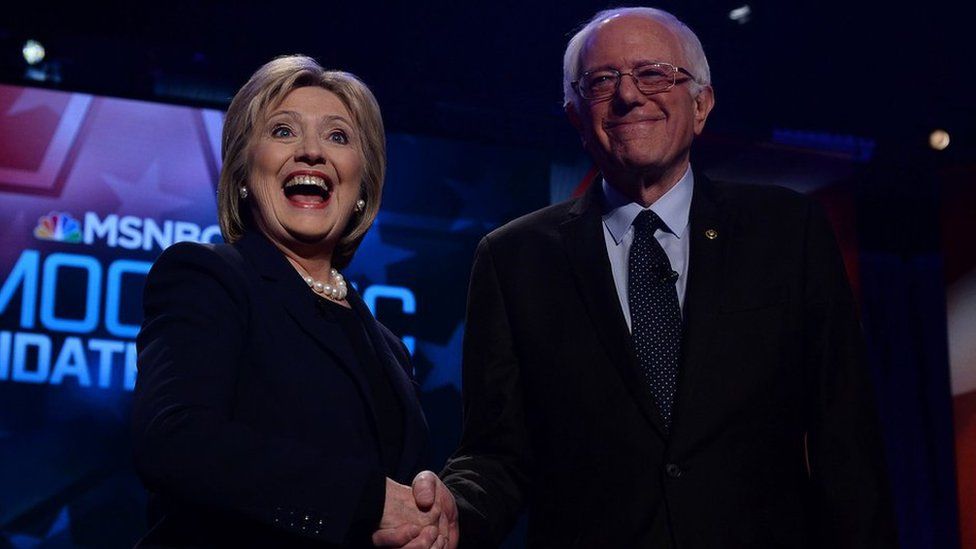What does it mean to be a progressive in the US?
- Published

Two Democratic candidates for the US presidency, Senator Bernie Sanders and Hillary Clinton, are fighting over the term "progressive". But what does the word really mean?
In a CNN town hall on 3 February in New Hampshire Mr Sanders and Mrs. Clinton argued over what the word "progressive" means and who has the right to describe themselves in this way.
Mr Sanders said she's not a liberal when it comes to foreign policy and other issues. She disagreed with him, saying that she's "a progressive who likes to get things done". She added that she was "amused" that he'd "set himself up as the gatekeeper of who gets to be a progressive".
So what is a progressive?
Politicians, activists and others disagree about what the word means. Historians concede that there's no precise definition. Still they say that in general a progressive fits certain criteria.
A progressive is someone who wants to see more economic and social equality - and hopes to see more gains in feminism and gay rights. They're also supportive of social programmes directed by the state - and they'd like social movements have more power in the US.
Within the realm of progressive, however, there are different, warring factions, explains David Greenberg, the author of a book called Republic of Spin: An Inside History of the American Presidency.
One group is dominated by activists from social movements such as Occupy Wall Street and Black Lives Matter, he says, and the other is led by those who belong to the left wing of the Democratic Party (and aren't part of a social movement or cause).
Pretty much all of of these progressives "view politics as a bottom-up progress", says Julian Zelizer, an historian at Princeton, and they support the fight for social change. (Though not everybody is on the streets, clamouring for it.)
They also believe that the government can help people, and they look back fondly at Roosevelt's New Deal jobs programs, which relieved suffering in the 1930s.
For these reasons they see the world and its problems in a similar way, but they often have different ideas about how to fix them. Nearly all progressives agree that banks should be regulated, for example, though they argue about how it should be done. Some believe the regulation should be aggressive - and dramatically change things.
Bernie Sanders, says Greenberg. "wants to break up the banks".
Others are more moderate in their views. Mrs Clinton agrees with him in principle, says Greenberg, "but she doesn't want to do it willy-nilly".
But regardless of how they see the issue of banking, they're proud to call themselves progressive. For Democrats it's a coveted term. But it wasn't always that way.
Conservatives attacked a Democratic presidential candidate, Michael Dukakis, for being too lefty in the 1980s and tagged him with the word "liberal" . "It was seen as a dirty word," says Zelizer.
Afterwards Democrats tried to distance themselves from the term. When Bill Clinton ran for president in the 1990s, he tried hard to avoid the world "liberal".
During his campaign he cited economic research from a think-tank, the Progressive Policy Institute, and in this way he could promote "liberal economics without calling it liberal", says Greenberg.
In recent years Democrats have seen the notion of progressive politics in a different light.
The left has gone through a revival under President Barack Obama, says Michael Kazin, who teaches history at Georgetown University in Washington. explaining that "the Democratic Party has become a progressive party".
The fact that Democratic candidates are now fighting to show how progressive they are shows the way things have changed. As Zelizer says: "It signals that there is more room for the left in American politics than there's been for a while."